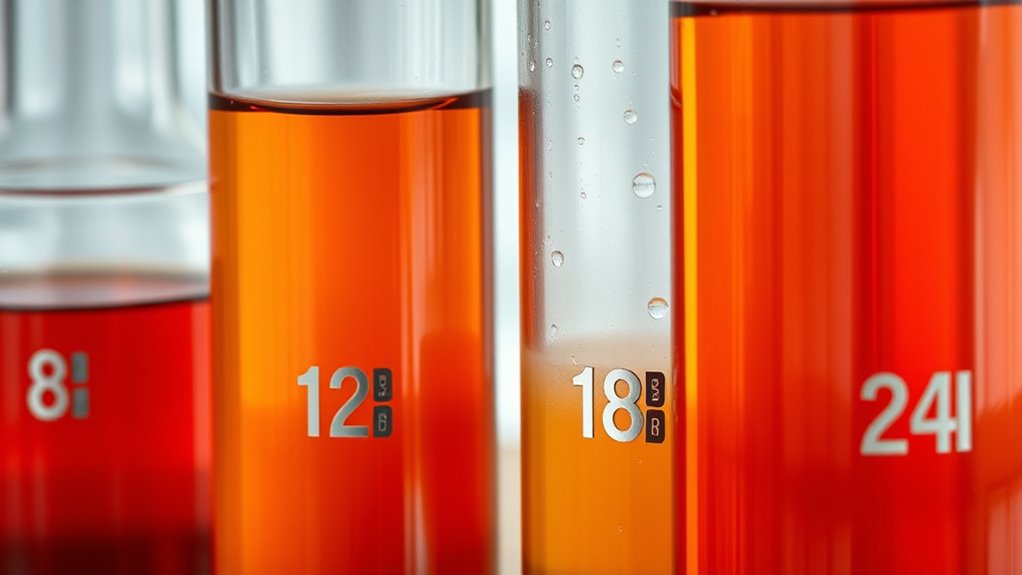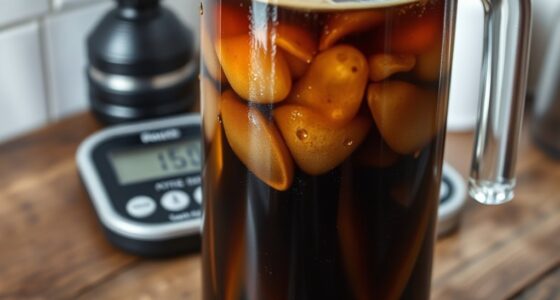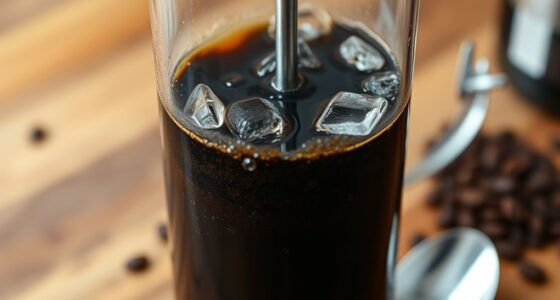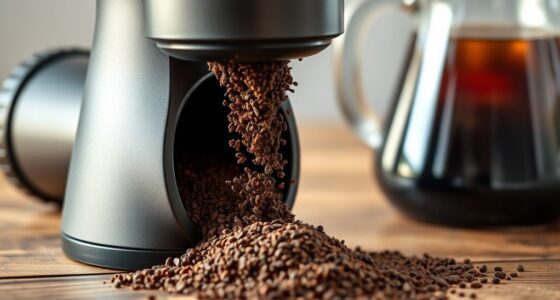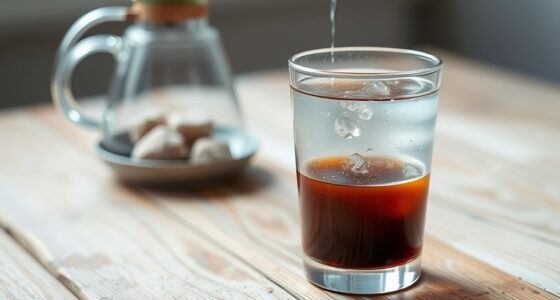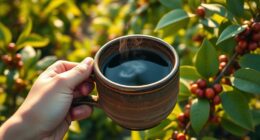Adjusting your steeping times from 8 to 24 hours greatly changes your tea’s flavor. At 8 hours, expect a light, fresh taste with minimal bitterness. Extending to 12 hours deepens the flavor, adding richness without overpowering. Going further to 18 hours brings more complexity and robustness, while 24 hours results in a concentrated, bold brew with intricate notes. If you keep exploring, you’ll discover how each duration offers a unique brewing experience.
Key Takeaways
- Short steeping (8 hours) yields a mild, bright flavor with minimal bitterness, ideal for delicate teas.
- Moderate steeping (12 hours) enhances richness and complexity while maintaining some brightness.
- Extended steeping (18 hours) develops deeper, more complex flavors, risking increased bitterness if not carefully managed.
- Long steeping (24 hours) results in a concentrated, robust brew resembling a tea infusion or concentrate.
- Precise control of temperature and time is essential to balance flavor development and prevent over-extraction at longer durations.
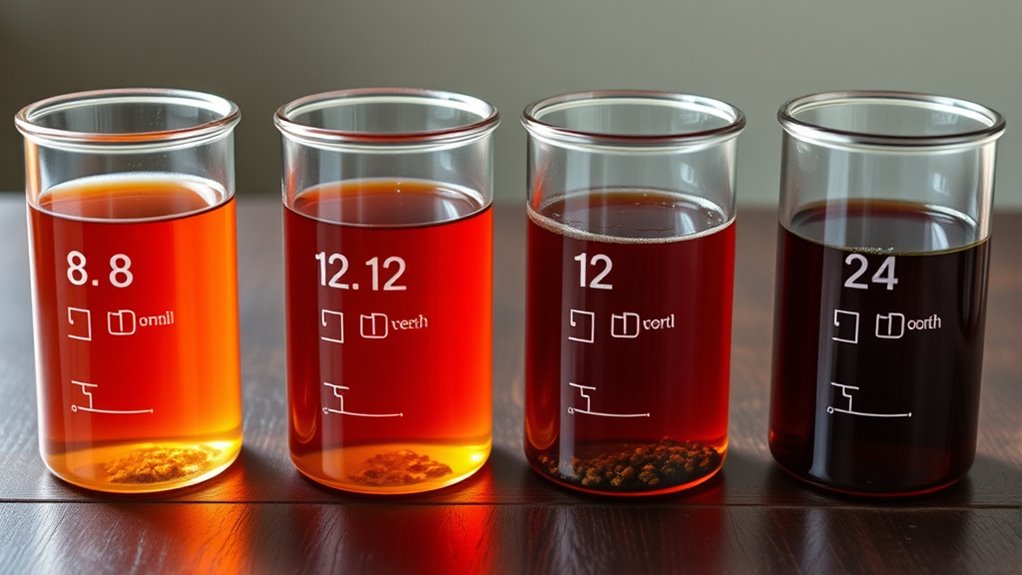
Understanding how steeping time affects the flavor of tea or coffee is vital for achieving the perfect brew. When you experiment with different steeping durations, you’ll notice how the tea’s flavor evolves, becoming more complex or sometimes overly strong. One critical factor that works alongside steeping time is brewing temperature, which influences how quickly flavors are extracted from the leaves or grounds. If you want a balanced tea flavor, you need to take into account both how long you steep it and at what temperature. For example, delicate green teas often require shorter steeping times and lower temperatures to prevent bitterness, while black teas can handle longer steeping with higher temperatures. By adjusting these variables, you control the intensity and character of your beverage.
Adjust steeping time and temperature to craft your perfect, balanced tea or coffee flavor.
When you steep for just 8 hours, the tea flavor is relatively mild, with many of the subtler notes still intact. This short duration extracts enough to enjoy a fresh, vibrant taste without overwhelming bitterness or astringency. The brewing temperature remains critical here—keeping it moderate ensures you don’t over-extract tannins, which can turn the tea bitter. As you extend the steeping time to 12 hours, the flavor deepens. You’ll notice the tea becomes richer, with more pronounced earthy or woody undertones, but it still retains some of its original brightness. At this stage, you might need to slightly lower the brewing temperature if you notice excessive bitterness, especially with more delicate varieties.
Moving into the 18-hour mark, the tea flavor continues to intensify, and the brew often takes on a more complex profile. The prolonged steeping begins to extract compounds that weren’t noticeable earlier, giving the tea a more robust and sometimes slightly fermented character. At this point, keeping the brewing temperature consistent is important to avoid over-extraction, which can produce a harsh or overly bitter taste. By the time you reach 24 hours, the tea has fully transformed; it’s more like an infusion than a traditional brew. The flavors are concentrated, sometimes resembling a tea concentrate or an aged wine, with a deep, complex profile. However, at this stage, the temperature and steeping duration need to be carefully monitored to prevent unpleasant bitterness.
In all cases, understanding how steeping time affects the tea flavor and managing brewing temperature accordingly helps you craft beverages tailored to your taste. Whether steeping for hours or experimenting with extended durations, consistently adjusting these variables ensures you get the most from your tea or coffee and enjoy a perfectly balanced, flavorful cup every time.
Frequently Asked Questions
How Does Steeping Time Affect Flavor Intensity?
You’ll notice that longer steeping times enhance flavor extraction, resulting in a richer, more intense taste. As you extend the steeping period, more flavors develop, deepening the overall profile. However, be cautious—oversteeping can lead to bitterness or undesirable notes. Finding the right balance allows you to optimize taste development while avoiding over-extraction, ensuring your brew achieves the perfect flavor intensity suited to your preferences.
What Are the Health Benefits of Longer Steeping?
Longer steeping can boost detox benefits and increase antioxidant levels in your tea. As you steep longer, more beneficial compounds are released, helping your body eliminate toxins and fight free radicals. This process enhances the health benefits, supporting immune function and reducing inflammation. Just be mindful of over-steeping, which can lead to bitterness, but overall, extended steeping offers you more potent health advantages.
Can Steeping Time Influence Caffeine Content?
Yes, steeping time influences caffeine extraction. The longer you steep, the more caffeine is released into your brew. With increased steeping duration, you’ll likely notice a stronger, more caffeinated beverage. If you want a milder taste with less caffeine, opt for shorter steeping times. Keep in mind that extended steeping can also affect flavor, so find a balance that suits your caffeine needs and taste preferences.
Which Steeping Time Is Best for Herbal Teas?
Ever wondered how to open the perfect herbal tea? For herbal teas, a steeping time of around 8 to 12 hours often yields the best infusion, maximizing herbal potency without bitterness. Longer steeping can make the tea overly strong or dull. You should experiment within this window to find your ideal balance, ensuring you enjoy the full flavor and benefits of your herbal infusion.
How Does Temperature Interact With Steeping Duration?
Temperature effects can considerably influence how your tea steeps, affecting both flavor and potency. When you increase temperature, extraction speeds up, which may lead to stronger, more consistent steeping if you keep the duration steady. Conversely, lower temperatures require longer steeping times to achieve the same flavor, impacting steeping consistency. Balancing temperature and steeping time ensures your herbal tea reaches the desired strength without becoming bitter or weak.
Conclusion
As you wait for your tea to steep, each minute reveals a deeper flavor, but the perfect balance remains just out of reach. Will the 8-hour brew unveil subtle notes or fall flat? Could 12 hours bring a richer complexity, or will it become overpowering? The 18 and 24-hour infusions promise boldness, but at what cost? The true magic lies in your next sip—are you ready to discover which steeping time unlocks your perfect brew?
